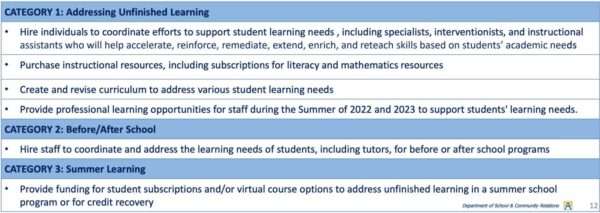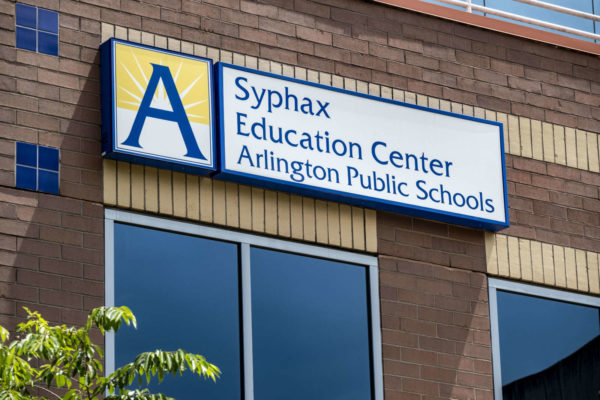(Updated 1:10 p.m.) Arlington Public Schools is applying to the state for more than $15.6 million in federal funds to tackle pandemic-era learning loss.
The school system says it would use the money to provide more specialized instruction, before- and after-school tutoring and expanded summer school offerings.
This money would add to the $18.9 million in American Rescue Plan Act (ARPA) and Elementary and Secondary School Emergency Relief (ESSER) III funds APS was allotted in April of this year.
“Every state received funds to distribute to school divisions as they saw fit,” Superintendent Francisco Durán said in a Nov. 16 School Board meeting. “We have heard from [the Virginia Department of Education] that school divisions, all of them, will receive some [money] if they apply.”
Applications were due last week, and the funds can be used through September 2024.
“We should know in January what funds APS may be awarded to support this work,” said APS spokesman Frank Bellavia. “We should know what grant funds we were awarded by the end of January.”

Earlier this year, APS said that it would use the $18.9 million in ARPA funding it was allotted to balance the 2022 budget, which included paying for assessments, summer school, 12 reading and math coaches and a new Director of English Learners.
The bulk — $10.5 million — went to the new Virtual Learning Program, which had a bumpy start and today serves 630 children from diverse background. Of those students, 77% are Black, Hispanic or Asian, 60% are eligible for free- or reduced-price lunch, and 39% are English Learners, according to APS.
None of these expenses, however, increases instructional time for children, which is what parent advocacy group Arlington Parents for Education says the money should have been spent on. The organization formed last year to advocate for full-time, in-person learning while APS was remote, and now focuses on learning loss and ARPA spending.
The group had a lukewarm response to the additional instructional time outlined in the grant application.
“While any funds tied to additional instruction time are welcome, this application will likely be too little, too late. The state ESSER funding will not fund any new instruction until at least fall of 2022 and is expressly tied to providing expanded summer school, before and after school instruction, and tutoring,” APE said. “It is disappointing that APS must again (as with the reopening of schools in spring) be led by the state to do what it already has the resources to do and should already be doing, which is to provide more instructional time.”
In addition to tutoring, the parent group says, APS should look at extended school days and extended school years — and use carryover funds from the 2021 budget to do so. It pointed to Fairfax County and Prince William County public schools, which have a variety of strategies for increasing instructional time as part of their academic recovery plans.
Meanwhile, APS is focused on what it calls “accelerated learning.” During the regular school day, teachers cover all grade-level standards and, where necessary, re-teach essential standards that their students missed last year and need to understand new material.
“The current focus on ‘acceleration’ suggests that students are somehow going to learn faster, but it isn’t magic — students need more instructional time, which APS is not providing,” APE said. “APS students have suffered a significant decline in performance, with score declines five times greater than anything APS has seen in the past.”
For example, fail rates in standardized math and reading tests increased between 2018-19 and 2020-21 across all elementary schools, with the rates more pronounced among APS’s Title I schools (in which 45% or more of the student population receives free or reduced lunch).
“This requires more than business as usual to recover that lost instruction,” the group said.
Arlington Public Schools disagrees with this assessment of accelerated learning.
“We are focused on addressing the identified key gaps during current instruction at the appropriate time because students are able to receive grade-level material and make connections to key concepts,” Bellavia said. “The approach that we use during instruction ensures equitable access for all students.”
Students who are not meeting benchmarks are already receiving some extra services, the APS spokesman said. They participate in small-group work, receive additional support before, during and after school, and are assigned additional lessons via iPad apps.
The grant funding would expand on these services by hiring more educators, training them to provide services more effectively, and buying more student app subscriptions.
The 2020-21 standardized test scores demonstrated lost learning while APS provided virtual instruction and a hybrid of in-person and online instruction last school year. Soon, APS will have new detailed information on student performance this academic year, when most are back in-person, Bellavia says.
During the School Board’s Thursday, Dec. 16 meeting, Durán will discuss first quarter grades, providing the first high-level insight into the efficacy of APS’s accelerated learning plan.


